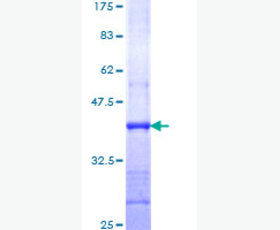Recombinant Mouse Legumain/Asparaginyl Endopeptidase
| Product name: | Recombinant Mouse Legumain/Asparaginyl Endopeptidase |
| Source: | Human Cells |
| Purity: | Greater than 95% as determined by reducing SDS-PAGE. |
| Buffer Formulation: | Supplied as a 0.2 μm filtered solution of 20mM Tris,150mM NaCl,20% Glycerol,pH8.0. |
| Applications: | Applications:SDS-PAGE; WB; ELISA; IP. |
| Storage: | Avoid repeated freeze/thaw cycles. Store at 2-8 oC for one month. Aliquot and store at -80 oC for 12 months. |
| UOM: | 100ug/50ug/200ug/1mg/1g |
| Source | Human Cells |
| Description | Recombinant Mouse Legumain/Asparaginyl Endopeptidase is produced by our Mammalian expression system and the target gene encoding Val18-Tyr435 is expressed with a 6His tag at the C-terminus. |
| Names | Legumain;Lgmn;Asparaginyl endopeptidase;Protease cysteine 1;Prsc1 |
| Accession # | O89017 |
| Formulation | Supplied as a 0.2 μm filtered solution of 20mM Tris,150mM NaCl,20% Glycerol,pH8.0. |
| Shipping |
The product is shipped on dry ice/ice packs. |
| Storage |
Store at < -20°C, stable for 6 months after receipt. Please minimize freeze-thaw cycles. |
| Biological Activity |
IN STOCK |
| Purity |
Greater than 95% as determined by reducing SDS-PAGE. |
| Endotoxin | Less than 0.1 ng/µg (1 IEU/µg) as determined by LAL test. |
| Amino Acid Sequence |
VPVGVDDPEDGGKHWVVIVAGSNGWYNYRHQADACHAYQIIHRNGIPDEQIIVMMYDDIANSEEN PTPGVVINRPNGTDVYKGVLKDYTGEDVTPENFLAVLRGDAEAVKGKGSGKVLKSGPRDHVFIYF TDHGATGILVFPNDDLHVKDLNKTIRYMYEHKMYQKMVFYIEACESGSMMNHLPDDINVYATTAA NPKESSYACYYDEERGTYLGDWYSVNWMEDSDVEDLTKETLHKQYHLVKSHTNTSHVMQYGNKSI STMKVMQFQGMKHRASSPISLPPVTHLDLTPSPDVPLTILKRKLLRTNDVKESQNLIGQIQQFLD ARHVIEKSVHKIVSLLAGFGETAERHLSERTMLTAHDCYQEAVTHFRTHCFNWHSVTYEHALRYL YVLANLCEAPYPIDRIEMAMDKVCLSHYVDHHHHHH
|
| Background | Mouse Legumain,also known as LGMN, is a cysteine protease belonging to peptidase family C13 and is expressed in kidney and placenta abundantly. LGMN has a strict specificity for hydrolysis of asparaginyl bonds. It can also cleave aspartyl bonds slowly, especially under acidic conditions. The mammalian legumain is involved in the processing of proteins for MHC class II antigen presentation in the lysosomal/endosomal system. It plays a role in the regulation of cell proliferation via its role in EGFR degradation. Legumain deficiency causes the accumulation of pro-Cathepsins B, H and L, another group of lysosomal cysteine proteases. Overexpression of Legumain in tumors is significant for invasion/metastasis. Mammalian legumain is inhibited by iodoacetamide and maleimides. Legumain activation appears to be autocatalytic and can be triggered by acidic pH. |














